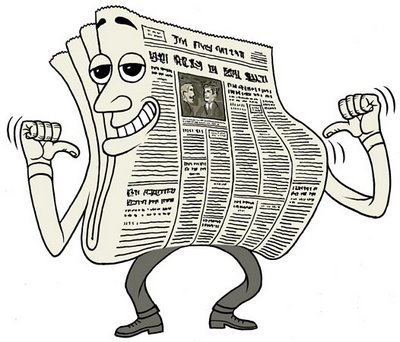
press box: Media criticism.
Love Me, I'm a Journalist
A profession's romance with itself.
By Jack Shafer
Posted Wednesday, Oct. 25, 2006, at 10:42 PM ET
Illustration by Mark Alan Stamaty. Click image to expand.On Monday, I singled out Tim Rutten of the Los Angeles Times and the Washington Post's Howard Kurtz as I admonished journalists for overreacting to staff cuts at newsrooms around the country.
In his columns, Rutten warns that the threatened cuts at the Los Angeles Times will injure democracy and the "stakeholders" (as opposed to stockholders) who rely on the Times' broad coverage. Kurtz declares that news organizations' "corporate slashing" will "mean fewer bodies to pore over records at City Hall, the statehouse or federal agencies"—even though he gives no examples of a newspaper slashing its hard-news staff.
In an e-mail to me, Kurtz expands his point, writing that "some papers are overstaffed, not all belt-tightening is bad and newspapers need to adapt to the digital age. So I don't think I was playing 'hands off the newsroom or we'll shoot this investigative reporter'—just noting that some of these incredibly shrinking papers are likely to find investigative work an unaffordable luxury."
Click Here!
Rutten writes, too. He concurs that a high head count doesn't necessarily guarantee journalistic excellence, "but I'm just as sure that there is a number below which excellence becomes impossible. Is that number in the Times' case 939 or 800? I don't know, and neither does anybody else. I do know, though, that at some point, you have too few good and experienced people to do the job and I, for one, don't want to flirt with that edge."
However appalling newsroom downsizing may be for journalists, it will ultimately reveal what the people who run and own newspapers really think their publications are for. Scratch a serious reporter, and he'll offer volumes about the "public service" his newspaper performs in the form of investigations: It watchdogs government. It keeps corporations honest. It uncovers the dastardly deeds of foreign dictators and prevents genocide. It exposes quacks and charlatans. (It turns the common man into a Socrates if he reads the editorials!)
Newspaper people have enormous egos, if you get my drift, and don't mind massaging the big hairy things in public. Yet the press is hardly the sentry and bulwark of society that reporters imagine it to be. I don't mean to disparage reporters who put their lives on the line to file from Iraq, nor the sleuths who sift through databases to uncover wrongdoing by pharmaceutical companies, or any other enterprising reporter. But too many journalists who wave the investigative banner merely act as the conduit for other people's probing, as George Washington University professor and former investigative journalist Mark Feldstein suggests in a paper-in-progress titled "Ventriloquist or Dummy?"
Feldstein cites a 1992 piece by the late Christopher Georges in the Washington Monthly to illustrate his thesis. Georges reviewed about 800 articles by investigative reporters from the Washington Post, the Los Angeles Times, and the New York Times published over three years and found that "nearly 85 percent of them have been follow-ups or advances of leaked or published government reports." Georges' study is anecdotal since his piece did not name the stories analyzed or describe his methodology, but my hunch is that his conclusions aren't far from the truth.
As Feldstein writes, there's nothing inherently wrong with investigative journalists throwing the spotlight on government reports as part of their mission, as long as the information is accurate and the journalists aren't being spun. But it subtracts from the journalists' self-images as tireless messengers of truth turning millions of pages at the courthouse or the SEC.
"Hitching ourselves to government investigators' bandwagons does more than make us lazy; it leaves us—and the rest of America—thinking falsely that we are looking where the government isn't," Georges wrote. Feldstein adds this codicil: "[I]f investigative reporters can really be turned into something akin to ventriloquist dummies, how independent can other journalists really be?"
In my Monday piece, I noted that many of the so-called investigative scoops that originate inside government come from such nonprofit outfits as the Center for Public Integrity. As former New York Times-man Bill Kovach told Georges, "Most of what we call investigative journalism these days … is really reporting on investigations."
Before all you investigative reporters who survived on maggots and pomegranates for a year to uncover human rights atrocities in Afghanistan start sharpening your knives for my scalp, please relax. My admiration for original investigative reporting knows no bounds. But the defenders of journalistic excellence will have to make a better case for the connection between big staffs and great journalism before I don my helmet and rush to man the Los Angeles Times barricades.
******
Disclosure: Feldstein is a friend—not as good a friend as David Corn, but a lot better than Michael Isikoff. Also, if this column were 1 percent more like my Monday column, I'd sue me for copyright infringement. Send your lawsuit to slate.pressbox@gmail.com. (E-mail may be quoted by name unless the writer stipulates otherwise. Permanent disclosure: Slate is owned by the Washington Post Co.)
No comments:
Post a Comment